I am having trouble in saving a Hashset in hibernate. I am trying to save more than one entries but it is only saving the first item it gets. I am looping through and adding new element to set in every iteration but in the end its size is always 1. After execution, in database table, a new priceList is created but only one entry is created in price table (It should create 5). More info in images.
PriceList.java
@Id @GeneratedValue(strategy = GenerationType.IDENTITY)
private Integer id;
public void setId(int id){
this.id = id;
}
public Integer getId(){
return this.id;
}
@Column(name = "name")
@NotBlank( message = "Name is required" )
private String name;
public void setName(String name){
this.name = name;
}
public String getName(){
return this.name;
}
@OneToMany(mappedBy = "priceList", fetch = FetchType.LAZY, cascade = CascadeType.ALL)
@JsonIgnore
private Set<Price> prices = new HashSet<Price>();
public void setPrices(Set<Price> prices)
{
this.prices.addAll(prices);
}
public Set<Price> getPrices()
{ return this.prices; }
Price.java
@Id @GeneratedValue(strategy = GenerationType.IDENTITY)
private Integer id;
public void setId(int id){
this.id = id;
}
public Integer getId(){
return this.id;
}
@ManyToOne
@JoinColumn(name = "product_id",referencedColumnName = "id")
@JsonSerialize(using = ProductSerializer.class)
private Product product;
public void setProduct(Product product){
this.product = product;
}
public Product getProduct(){
return this.product;
}
@ManyToOne
@JoinColumn(name = "price_list_id",referencedColumnName = "id",updatable = true,insertable = true)
private PriceList priceList;
public void setPriceList(PriceList priceList){
this.priceList = priceList;
}
public PriceList getPriceList(){
return this.priceList;
}
@Column(name = "price")
private float price;
public void setPrice(float price){
this.price = price;
}
public float getPrice(){
return this.price;
}
@Column(name = "discount")
private float discount;
public void setDiscount(float discount){
this.discount = discount;
}
public float getDiscount(){
return this.discount;
}
In My Controller i am doing this
Controller
PriceList defaultPriceList = priceListService.findDefaultPriceList();
List<Price> defaultPriceListPrices = pricesService.findPricesByPriceList(defaultPriceList);
Set<Price> newPrices = new HashSet<Price>();
System.out.println(defaultPriceListPrices.size());
for (Price p : defaultPriceListPrices)
{
Price myPrice = new Price();
myPrice.setPrice(p.getPrice());
myPrice.setDiscount(p.getDiscount());
myPrice.setProduct(p.getProduct());
myPrice.setPriceList(p.getPriceList());
newPrices.add(myPrice);
System.out.println("product id" + myPrice.getProduct().getId());
System.out.println("price list id" + myPrice.getPriceList().getId());
System.out.println("price" + myPrice.getPrice());
System.out.println("discount" + myPrice.getDiscount());
System.out.println();
}
System.out.println("new prices size" + newPrices.size());
priceList.setPrices(newPrices);
priceListService.save(priceList);
I am currently getting this output on console
Before Execution
After Execution
UPDATE
Price.java
@Override
public boolean equals(Object object) {
if (object instanceof Price) {
Price price = (Price) object;
return
price.getId() == this.getId() && price.getPriceList().getId() == this.getPriceList().getId();
}
return true;
}
@Override
public int hashCode() {
return new HashCodeBuilder(17,37)
.append(id)
.toHashCode();
}




